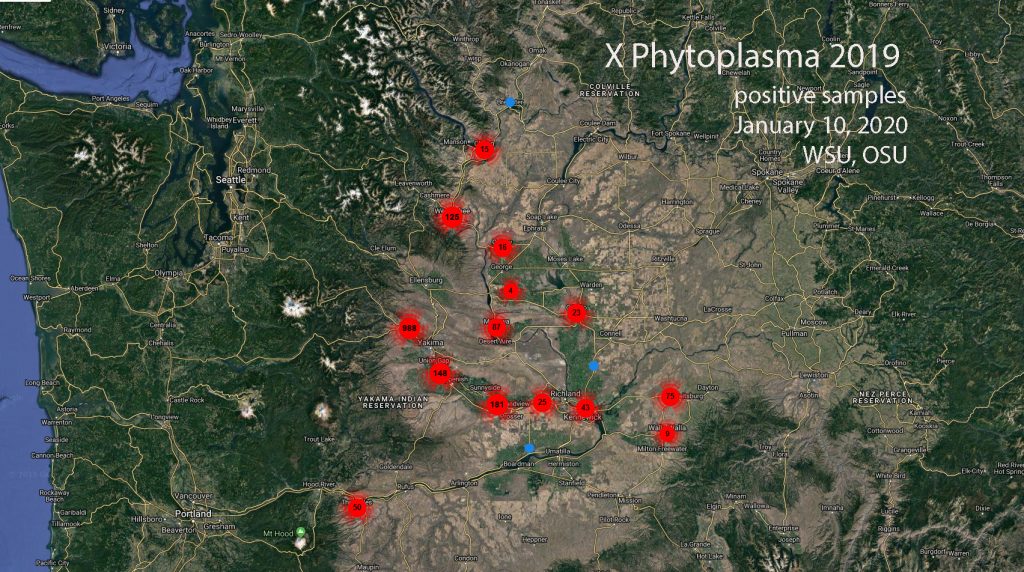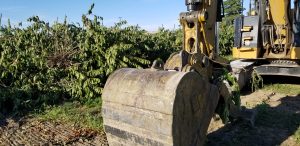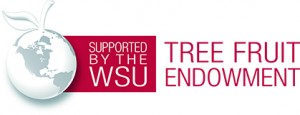Written by Tianna DuPont, WSU Extension. February 5, 2020. Update April 15, 2020.

X Phytoplasma has reached epidemic levels in Washington cherries with 2,629 positive samples in 2019. X Phytoplasma (also called Western X, Cherry Buckskin and Peach X) is one of the organisms which causes little cherry symptoms commonly described as Little Cherry Disease. Cherries with X Phytoplasma have small bitter cherries. Little Cherry Virus (LCV1 and LCV2) can also cause similar symptoms. X Phytoplasma also infects nectarines, peaches, plums, and apricots. The organism lives in the vascular system of the tree and cannot be cured – infected trees have to be removed. Thirty-eight percent of the 6969 samples submitted to WSU’s Virus Diagnostics Testing Lab tested positive for X Phytoplasma. With three times as many samples submitted in 2019 and the percentage of positives up from 25% in 2018, there is real cause for concern.
“The problem is distributed throughout the cherry growing region,” explained Scott Harper, WSU Plant Pathologist at North Central Washington Stone Fruit Day, “All growers need to aggressively scout for and remove infected trees to slow down the epidemic.” With more than 1400 positive samples in the Yakima area hundreds of acres are being removed due to the disease but the problem is also present in growing numbers in the Wenatchee area (140 positive samples), Chelan to Omak (16 positive samples), Kennewick/ Pasco (72 positive samples), Walla Walla area (84 positive samples) and in Oregon (50 positive samples) (See Figure 2). WSU Extension worked with Scott Harper, growers and programmers to create a map to help track the extent of the problem. The program uses an algorithm to group positive samples from specific GPS coordinates. Zooming in (Figure 3) one can see that the problem is distributed throughout the growing region.


Scouting and tree removal of infected trees will be critical next year. “Things are likely to get worse before they get better,” says Harper, “A community approach is needed. We can not ignore the problem because then it will get worse.”

WSU, OSU and industry stakeholders are working together to bring resources and answers for growers as they meet this challenge. Tobin Northfield, WSU Entomology is leading the Little Cherry Taskforce. He and Scott Harper have had several projects funded to find answers. The effort to get the word out has reached more than 2,768 people through presentations and 2,868 website readers as the WSU team (Northfield, Harper, DuPont, and Sallato) and OSU team (Thompson, Pscheidt) have presented at 20+ grower meetings throughout Washington and Oregon. As we work together to mitigate this problem it is critical to stay up to date on the latest information. X Phytoplasma and Little Cherry Virus pages will be kept up to date as new information develops.

In a recent effort WSU is surveying growers to see the impacts of X Phytoplasma and Little Cherry Virus on the industry. Only 16% of survey responses are in so far but already the survey documents 28,718 cherry trees removed to X Phytoplasma or Little Cherry Virus.
Resources
- X Phytoplasma https://treefruit.wsu.edu/crop-protection/disease-management/western-x/
- X Phytoplasma Q&A https://treefruit.wsu.edu/article/western-x-questions-and-answers-what-do-we-know-what-do-we-not-know/
- Little Cherry Virus https://treefruit.wsu.edu/crop-protection/disease-management/little-cherry-disease/
Contacts
- Scott Harper, WSU Department of Plant Pathology (509) 786-9230 or scott.harper@wsu.edu
- Tobin Northfield, WSU Department of Entomology, Tree Fruit Research and Extension Center, (509) 293-8789 or tnorthfield@wsu.edu
- Tianna DuPont, WSU Extension, North Central Washington Regional Extension Specialist, (509) 293-8758 or tianna.dupont@wsu.edu
- Bernardita Sallato, WSU Extension, South Central Washington Regional Extension Specialist, (509) 439 8542, b.sallato@wsu.edu
- Ashley Thomson, OSU Extension (541) 296-5494 Ashley.Thompson@oregonstate.edu
Fruit Matters articles may only be republished with prior author permission © Washington State University. Reprint articles with permission must include: Originally published by Washington State Tree Fruit Extension Fruit Matters at treefruit.wsu.edu and a link to the original article.
